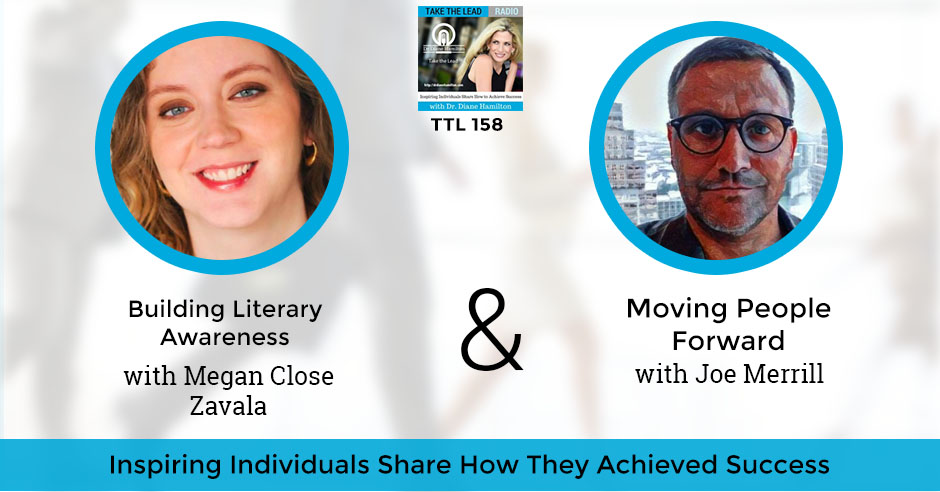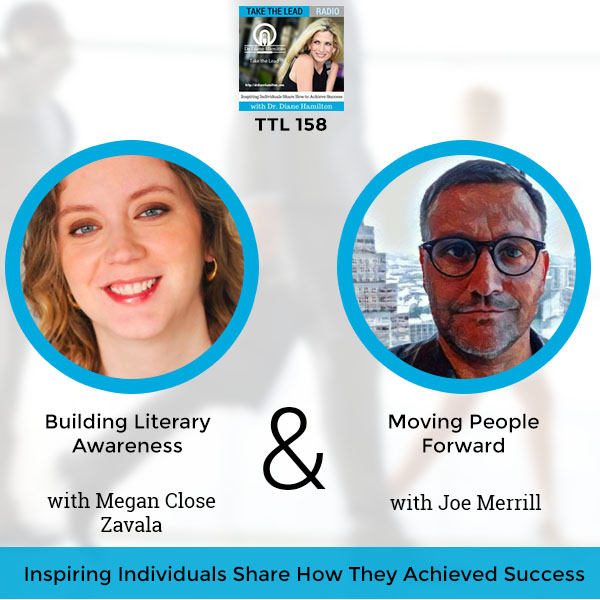Books have become the new business card, so there is greater need for book coaches than ever before. After speaking on many writing conferences, Megan Close Zavala realized that a lot of her writer-audience doesn’t get the help they ask for. Aside from helping writers on all stages of their publishing journey, Megan also helps build awareness of literary perspectives. Joe Merrill wants to help people and make the world a better place. He went from being a diplomat to a venture capitalist and asks his clients odd questions that reveal their personalities and how they would approach a problem.

I’m so glad you joined us because we have Megan Close Zavala and Joe Merrill on the show. Megan is a literary agent and book coach and she’s going to answer all kinds of questions. Anybody who’s thinking of writing a book, you’re going to get your questions answered. Also Joe, he has really interesting background with venture funds. His company is Sputnik ATX.
Listen to the podcast here
Building Awareness And Moving People Forward with Megan Close Zavala
I am with Megan Close Zavala who’s a literary agent, book coach and lifelong bibliophile. She worked in the entertainment industry for years before realizing she was in the wrong place. As an agent, she has worked with New York Times and international bestselling authors and speakers at Writers’ Conventions nationwide and she’s trained hundreds of authors on all things book and publishing related. Welcome, Megan.
Thank you so much.
I get so many people on my show who have either written a book or want to write a book. They talk about the book being the new business cards, so everybody’s writing one now. I’d be interested in just having a little background about you and your work with authors.
I did work in the entertainment industry but burned out of that pretty quickly. I started as an editorial assistant at a literary agency. I was pretty quickly promoted to agent and that’s when I started representing authors which has been hugely satisfying. I’ve had a great opportunity to work with some really wonderful talented authors and really learn the ins and outs of the publishing industry. What I realized as I was speaking at these writers’ conferences and connecting with these authors, and learning the ups and downs of the industry was that there was a large percentage of the writing audience that weren’t being helped. Quite frankly, agents work on commissions. As literary agents, we don’t make money unless the book sells. Therefore, logically we can’t really take on a lot of clients that might be at the beginning of stages of their book or trying to really figure out what they want to write about or what their writing career looks like to them.
That is why I started my book coaching and editorial services company because I really like helping people in all stages of their publishing journey. You can check all the boxes as far as having followers on social media and connections within your industry, but if you don’t have a good book, there is only so far you can go. That’s been really gratifying to help people put together that roadmap to take them where they want to go with their careers, which can vary from person to person, and take that book from first page to last page.
I worked with my agent many years ago and the first thing that you hear is platform. Can you explain why platform is so important and why they care so much about that?
This is hugely important for non-fiction authors in particular but also for fiction authors. Platform can be anything from having social media followers to having speaking engagements across the country or a huge mailing list or just a combination of all of the above. What it’s really illustrating to agents and editors is that you have a built-in audience that will theoretically buy that book, that aspect of it. You are talking and interacting with this group of people, so people care about what you have to say. They see you as an expert in your field and that you’re illustrating that this topic is commercial. Anyone can have a great idea but if they can’t prove that the publisher’s going to make money then nobody’s going to be interested. With platform, everyone’s unique and you really have to assess how your audience likes to get their information. Some people might have that following on Twitter, people that have 500,000 followers on Twitter who are just loving their short blurbs and things like that.
Then you’re going to have the people that have followers on Instagram, or the people that make their living doing podcasts or traveling across the country. It’s really finding out what you can do well and how your audience is connecting with you. For the fiction authors, you’re not establishing that you’re an expert in your field like you would if you were sharing weight loss secrets or financial planning suggestions, but it’s still a way to show that you are a talented writer and that people are curious as to what you have to offer. That’s just even having an author website and guest login and things like that. There are lots of ways you can build your platform even if you have to think outside the box a little.
Once you’ve written a book and you’ve seen behind the scenes of what it takes to write a proposal and query, there are so many ways to get the attention of somebody like you to represent them. People often don’t know that there’s a lot before they even get your attention. What are the steps to get to you?
Number one, if you’re a non-fiction author, you need to put that book proposal together. You need to have your overview where you talk about what the book’s about, who’s going to read it, and why are you’re the one to write it, and then author’s bio, marketing plan comparative titles, chapters, summaries, sample chapter, that kind of thing. You need to have it really fleshed out well in your mind what story you’re sharing with the world. Once you have those pieces together, that makes it so much easier to be able to talk to people about it and reach out to people and submit your materials to agencies and things like that. You should be working on your platform constantly. It’s not just something that happens until you get the book deal or once the book deal comes out. You need to be constantly cultivating, growing, and serving that audience overtime. You should be working on that concurrently with your book proposal or if you’re a fiction author with your manuscript itself.

Building Awareness: You need to be constantly cultivating, growing and serving that audience overtime.
When it comes to reaching out to agents, not all agents represent the same things. In my coaching life, I work with people in all genres. I just edited a marketing book and the fantasy book in one week, for example. Lots of the agencies like the one that I’ve worked for do strictly non-fiction. If you have your romance novel, we’re not the right people for you. You just need to do your research. You can go to websites like PublishersMarketPlace.com. You can look at those comparative books that are comparable to yours and the acknowledgement section where they’ll say, “Thanks to my agent, so and so.” You can even do a straight Google search and just look at the literary agencies. You want to make sure that they’re interested in acquiring your genre, and also that they’ve demonstrated that they’ve had some success. You wouldn’t want to trust your book project to just anybody. If you see that they’ve only sold romance novels, you’re not going to want to send your book on international affairs to them.
It’s really just important to follow the submission guidelines. It seems silly and basic to talk about but I’m sure there are agencies that receive thousands of queries a day. Lots of people won’t open e-mails with attachments. If it says don’t send attachments, don’t send attachments because you’re risking having put all that effort into getting your project put together and someone just going to delete it. It’s really finding where you think will be a good home for your projects, and then figuring out how to best communicate the qualities of your book and you as an author. When you’re talking to agents or pitching or whatever, it’s talking about all the amazing things you’ve done in your life that relate to the book and then what the book is offering that is new, better, or different than what is already out there.
When I was pitching one of my books, it was about personal finance and I remember that Suze Orman has that entire market. There are certain things that it’s very difficult to break in to certain specific things if somebody’s got the hollo on it. How much bad stuff do you read compared to good? What’s the percentage?
I feel like a cruel person for calling it that, but the vast majority of it is either awful or people just haven’t been well-informed or they don’t think that they need to make the effort. Lots of times we’ll get projects from people that might have something great to say. They want to write the ultimate book on building your business, but they just got their first real adult job out of college or something. They might have the secret, but other than guiding them in ways that they could build their platform and make their book marketable, I have to say, “Best of luck. Call me in a few years or if something amazing happens.” This is also one of the big challenges of my current professional life is that people think that once they’ve got an idea or once they’ve written a book, the hard part is over. That’s the easy part frankly. That doesn’t mean it didn’t require blood, sweat, and tears, but you need to market yourself. You need to get those connections and things like that.
People are willing to spend thousands and thousands of dollars a year on fitness coaches, on health coaches, on business coaches, on all sorts of people that can help you take some area of your life to the next level. It either never occurs to them or they really don’t understand the benefit of working with a book coach. It’s not just, “You really should put the period here or this sentence is a fragment or something’s spelled wrong.” It’s having an expert in the field look at your book from an outside and professional perspective and say, “Okay, here’s what’s great, but here’s how we can make it better. Here’s how we can give your book the best shot possible.” A lot of my job is building the awareness around that so people know that they can go and seek out these people to have them help them. It’s not just reading book after book or reading blog entry or subscribing to Writer’s Digest or whatever. It’s really about having that partner and cheerleader that can guide you through the process.
You work as a coach but you also still act as an agent. Do you do both?
I do. The majority of my work right now is coaching, but I do occasionally represent a project if something really great comes through the agency. I try not to have a lot of people in both groups because I would never want to give the impression that, “If you work with me on coaching, I’ll be your agent.”
Do you ever guide people to do self-publishing then?
One of the first questions I ask people, whether it’s in the agency context or in the coaching context is, “What are your goals for your book?” Not everybody is the same. Someone wants to be in New York Times Best Seller, that’s fine. That’s one path. If someone has this book that they’ve been wanting to get written, it’s okay if they’re not in New York Times bestseller, they just want to see their name on the cover, that’s something else. Then there are lots of people that are speakers and they have publicists. They just want to sell their book at their speaking engagements, and that’s fine. It’s really figuring out what’s best for you. The challenge of the publishing industry right now is that unless you are the biggest superstar in the world, book advances are not what they used to be. Until you become that superstar, you’re not really going to make a living with your book necessarily right off the bat. If you sign with Random House, you’re still going to have to be doing that marketing work on your own. They’ll be helping you. They have publicity teams and things like that. It’s not like in the days of yore where you could just sign your publishing contract and then just wait until you need to go to an occasional book signing.
I’ve worked with lots of authors that self-publish and they do really well and they are completely happy. It’s just figuring out what your goals are and being an informed consumer. I’ve seen lots of authors that think, “I’m going to beat the system. I’m going to self-publish. This self-publishing company is saying they’re going to make me a star.” There’s really no way to guarantee that. Read the fine print, and if someone says, “Yeah, we’ll advertise your book at this big book expo,” just know that 99% of the time that just means they’re going to have the book on a table with 200 other ones. Just be aware that when you are self-published, all that ugly marketing work that nobody really wants to do, that is 100% on your shoulders. Part of the coaching process is helping people make those decisions to figure out what they’re prepared to do themselves and what they want that end result to be. I’m a writer, too, so I have the little ego thing where I want to change people’s lives and have my book on everyone’s bookshelves in America and all that. Realistically, it might not be important to me to be that number one bestseller. That’s all I want.
You talk about bestsellers and you mentioned New York Times bestseller. Can you or can you not get to be a bestseller on that list if you have a self-published book?
You can as long as you have an ISPN number, the barcode number on the back. That’s how you track book sales. Everyone always cites Fifty Shades of Grey as an example. If you have a runaway hit, then absolutely.
It was an interesting example because I’ve never read it. I heard it was not very well-written. Would you agree?
[Tweet “A lot of times when I read just for me, it’s just to tune out to the world. “]It’s funny actually. That series is a guilty pleasure of mine. I would not say it was well-written. Sometimes we all need books that are escapism, especially for someone like me. I will never complain that I get to read for a living all day. Every now and then, I just want to not think about character arcs and chapter structure.
It’d be hard to read. I’ve taught sales forever so when people are selling to me, I’m analyzing their technique, so I get that.
I keep up with who the big authors are and what’s going on in the industry and stuff like that, but a lot of times when I read just for me, it’s just to tune out to the world. I still haven’t read Moby Dick or anything by Charles Dickens or anything like that, but maybe someday when I retire from all this, I will.
You mentioned how much they get as an advance. What do people expect to get and what do they actually get?
It totally depends. If you’re starting out, I wouldn’t expect in most cases more than five figures. There are always some outliers of course, but because people are buying less books, publishers are spending less money. They’re especially less likely to spend the money if you’re just starting out in your career, so you can’t guarantee them that you can bring in however many trillion people. It also depends on what type of publishing company you’re working with. You have Penguin Random House and Hachette and all the different imprints that fall under those big publishers. Then you also have smaller more boutique publishers and they might not be able to offer you as much upfront. There are some places that don’t offer you an advance at all but they will publish your book under their name and you’ll do better in the backend when it comes to residuals or how much marketing support they’ll provide or any number of those things. It’s just assessing what they’re offering, if you can get something better somewhere else. Authors should also keep in mind, and this is especially true for self-published authors, too, is that you can always reserve certain rights. You can keep the audio rights, for example, or foreign rights. You can either have an agent do it on your behalf or you can go off and sell that on your own.
I’ve heard a lot of authors complain that they’d signed away those rights. That’s a big thing if they want to give away a free audio version of their book.
Usually the bigger houses like to keep those rights, and they can because they’re the big guys. I’m not going to sign with Hachette because they want to do the audio books and that’s unlikely to happen. That is something right now that a lot of authors needs to be thinking about because they’re not going into it and have it be this millionaire overnight status type thing. There are always other ways you can continue to market your book and make money from them.
What do you think of the hybrid publishers? They give you a little more control, a little bit more like a self-publishing?
It just comes down to being an informed consumer which is the primary reason why authors should be working with agents. Obviously, if you’re self-publishing, you don’t need an agent.. You need to be able to understand what is being offered and what you are giving up, whether that’s rights or money or whatever, just so that you’re completely aware of where you stand because in addition to having to put in even more work, that’s the real downside to self-publishing. People go into it thinking, “This is going to be so much easier. I’m just going to sit back and everything’s going to happen for me.” Then they’re really disappointed and oftentimes they feel really ripped off because they didn’t do that extra research.
I imagine there are a lot of people who maybe have great content but they don’t know how to write very well. I was surprised by how many people have ghostwriters out there. Do you recommend ghostwriting for people ever?
I do. It’s hard especially for younger authors to be able to deal with the ego aspect of that. The whole reason for having a ghostwriter is not that you’re terrible and you have no skills. It’s that your skills lie in other areas. The vast majority of the famous people who write their memoirs or their autobiographies, they’re not really writing that. They are sharing those stories and maybe they are writing it in some sense, but someone else is coming in and using their skills as an actual professional writer to make it a good book. This happens a lot with non-fiction authors where you have some titans of the industry that has the ideas and the experience and the knowledge. They just need someone to help them get it out on page. That’s absolutely something someone should consider doing because if it’s a choice between hiring an editor or ghostwriter and never getting the book written at all, you should obviously go with the former.
That is another situation where you just got to do your research because anyone can say they’re a ghostwriter or an editor or whatever. You should make sure you are absolutely aware of what they’ve done in the past so you can see samples of their work, etc. There are ghostwriters I’ve worked with for so many agency clients and they specialize in business books, so they probably won’t be the person to go to for a memoir or something more fluffy.
It’s also not cheap when you have somebody else do that. To get your money back is a tough thing, isn’t it?
Yes, and it really comes down to what your goals are for this book. What does this book mean to you? You had mentioned it being a business card for some people. Some people are writing the book for ego purposes. Some people are writing the book to grow their business. Some people are to book more speaking engagements, sell more products, any number of things. You need to look at what you are doing as an investment in that.

Building Awareness: Some people are writing the book for ego purposes. Some people are writing the book to grow their business.
There are just so many factors when you’re creating a book. I was hoping you could at least share how people could find out more from you because you have such a wealth of knowledge and a lot of people need help.
My coaching company is Turn the Page Book Coaching & Editorial so my website is TurnThePageBookCoaching.com. I do represent clients occasionally through Keller Media which is KellerMedia.com. I interact mostly with my audience on the Book Coaching Facebook page so Facebook.com/TurnThePageBookCoaching. I’m always happy to answer questions or talk to people and discuss how I could possibly help them. They can always drop me an email through the website or at Megan@TurnThePageBookCoaching.com.
Thank you so much, Megan. This has been so fun to talk to you about this. This is so interesting and I learned even more things.
Building Awareness And Moving People Forward with Joe Merrill
I am with Joe Merrill who is a partner at Sputnik ATX, a startup accelerator located in Austin, Texas. Joe is also a partner with the Linden Group of Funds, Linden Education Partners, and Linden Ventures affiliated with Sputnik. Joe is a trustee at the University of Potomac in Washington, DC and was formerly a Career Diplomat at the US Department of State serving the United States at foreign missions in Sarajevo, Bosnia, Nigeria, Korea, it’s a pretty long list, and postings in Washington, DC. He received his MBA from University of Chicago. He also has a BA from UC Davis. It’s very interesting to have you on this show, Joe. I’m really looking forward to talking to you.
Thank you very much. It’s a pleasure to be on the show.
You’ve got an interesting background. How did you go from being a diplomat to a venture capitalist?
When I was an undergrad, I worked for a professor as a research assistant at UC Davis, Robert Feenstra, a great economist. I thought a lot about getting a PhD in Economics. I went and attended an MBA art conference in Cambridge. I came back from that going, “People in academia, they argue all the time about some things that quite frankly are not terribly germane.” I thought maybe it wouldn’t be the best thing for me. I love economics so I went into the State Department. I was looking for something in a way that I could make the world a better place. I know that sounds trite but that’s really what I wanted to do. I was an Economic Officer in the State Department and had a lot of great assignments. I was able to do a lot of really interesting things. By the way, for anyone coming out of college, if you have the opportunity to be a Foreign Service Officer, you should. It is the best thing you can do coming out of school.
America lost its way after 9/11. People thought of it as righteous indignation, but it really was just torturing people. We did some good things and we did some things that we really shouldn’t have on the diplomatic side in the State Department. When you’re in the business of trying to justify torture, that’s not a business I wanted to be in. I decided to leave, I resigned. You have the same skill set to be a diplomat and to go into finance, you spend a lot of time breaking down and solving problems, networking with people to come up with great solutions, and bringing people together to accomplish great things. I love venture capital because when you look at venture capital as a whole, venture capital has probably created more jobs and lifted more people out of poverty than any social welfare program that was ever devised.
[Tweet “Anyone with a good idea who’s willing to work can raise money and the sky’s the limit. “]If you think about venture capital, anyone with a good idea who’s willing to work can raise money and the sky’s the limit. We really impact people’s lives and we get to be a part of creating something with founders and makers doing terrific things. I love doing venture capital. Being a VC is really a privilege. My partner, Oksana, and I, we are thankful every day for the work that we’re able to do make the world a better place.
I was looking at some of the press releases of some of the stuff that you had announced lately. First of all, I’m interested in how you picked the name Sputnik. What’s the tie-in to the satellite there?
My partner is Ukrainian. Actually, it was my idea to name it Sputnik. We were thinking about a good name for the accelerator that will summarize a lot of our philosophies, both as investors and as people. The great thing about Sputnik was that it was the first thing that mankind put into space. It launched the space race. It got people to look up and to no longer think of human beings as being terra-bound. So much came from Sputnik. Most of the science fiction that we see today, whether it be from Gene Roddenberry or George Lucas, these were young men and young women who were looking up and watching this little satellite go over their home, and it made everyone think differently. From the space race, it produced massive amounts of innovation, everything from Velcro to the internet. All of these things because some guy had an idea that if you put a radio antenna in space, it could broadcast over a bigger area, so why wouldn’t we do that? These types of innovations, of getting people to do something that takes humankind a logarithmic or an exponential step function forward, we’re moving people to thinking bigger, looking beyond our immediate comfort zone, and doing extraordinary things. On top of that, Sputnik means “partner” in Russian. We want to be people’s partner to do revolutionary things, to make the world a better place, move mankind as a whole forward, and do great things.
You do really amazing things with your company. There are a lot of early stage accelerators out there. What makes yours unique, do you think?
There’s a whole ecosystem of accelerators. When you really look at what they do, they can be very different. There are accelerators for proto companies. If you have an idea and you don’t know what you’re going to do with it, you may not even want to create a company. You may just want to bounce the idea off of some people, get some advice from others who may have been in that business. There are accelerators for that where if you have an idea written on a napkin, you can come in. They show you how to form a company. You can get economic advice. There are accelerators that are very focused on certain verticals, for example, consumer product goods.
We have one here in Austin called SKU. They’re phenomenally good at what they do. They focus on consumer packaged goods. If I had a consumer packaged goods, I’d be talking to them. What makes us unique is we focus on what we call consumer surplus, companies that generate a massive amount of consumer surplus. That is the difference between what you pay for something and what you were willing to pay. We find breakthrough technologies and products generally generate a lot of consumer surplus, so we look for that. Companies that come to us need to have a minimum viable product and at least one customer. For example, certain businesses may only have one customer for the first year because it could be a very significant relationship, but we want you to have a customer. Minimum viable product or MVP, our customer, needs to be in Austin, Texas or a 300-mile radius in the long run because we like to sleep in our own beds at night.
Meowtel, and some of these others I saw are some of the four you chose recently. They had already met that criteria, I imagine. You asked certain non-traditional questions in the application process like what’s your spirit animal, Play-Doh or Plato? What are these off the wall questions? Can you tell me why you ask those and what are you trying to get out of it?
The obvious answer is we’re going to be spending three months with you and we really don’t want to have jerks sitting in our office. These questions are very revealing about people’s personalities. There are no wrong answers to these questions, but in how someone structures their response, it tells us a lot about how they think about a problem. If someone takes these as being trite and they give us some glib response, that tells us a lot about you. When people look at it and they see it as an opportunity in the application to express something about their business or themselves and they structure the answer in a very thoughtful way, bonus points. We had some really creative responses.

Building Awareness: If someone takes these as being trite and they give us some glib response. That tells us a lot about you.
What’s a good spirit animal or Play-Doh, Plato response you’ve heard?
One of the companies we accepted, Pei Technology, is a great company. They actually moved the company here at Austin to be in our program. They looked at this and they said, “This is interesting.” They got into the nature of Play-Doh and the nature of Plato, and how you could compare one school of thought to creativity and how those two things apply differently. Rather than choose one or the other, you could take the things from both that would benefit their lives. It demonstrated intellectual curiosity. They’d never thought about the nature of Play-Doh and they did a research on Plato to answer the question. Rather than give an obvious answer, they gave a really thoughtful response and quite frankly chose neither. They took the best of both.
What’s your spirit animal if somebody asked you that?
If I had to pick my spirit animal, it would be a cockroach or something, a scrappy little survivor. It would probably be something like a cockroach probably. They’re cleaner than people think they are. They’re survivors.
You’ve obviously got a process. Other than having them answer those questions, is there more to the process of what you’re looking for?
I talked a little bit about consumer surplus, if you go to our website or my blog, you can read more about that. We emphasize consumer surplus a lot in what we do. We only fund makers. Somebody on your founding team has to be the engineer or the person who can do it. That doesn’t always mean they’re engineers. It depends on the skill set that’s required to do product development, but someone on your team has to be able to do that hands-on product development. We absolutely look for that. We absolutely screen for that. We also are looking for people who have what Angela Duckworth calls Grit, which is a fantastic book, by the way, that perseverance and determination in order to make a startup company successful. We say it’s a knife fight in an alley to the death with Andre the Giant and he has a gun. The market is relentless. The market doesn’t care if you have the flu. The market doesn’t care if your co-founder is going through some serious challenges in their personal life, it doesn’t matter. The market doesn’t care. It moves on without you.
[Tweet “The market doesn’t care. It moves on without you. “]To be a successful founder of a company, you really have to develop nerves of steel and an ability to just persevere and go through and do the hard things that most people aren’t willing to do. If you’re going to go into that knife fight in the alley, you got to know that it takes that grit and that determination. While Andre the Giant is a lot bigger than you and he’s got a gun, he has weaknesses, too. You have to ruthlessly exploit those things and do it in a way that benefits the market and the consumers. That’s how capitalism works. I don’t just mean financially, we’re talking about doing something that makes the world a better place. If you do that, then you become the next Andre. Now everybody’s coming after you essentially. That’s a tough battle. That intellectual curiosity, that perseverance, pure intellectual firepower, humility, you have to know what your weakness is because Andre’s going to exploit that, too, so you got to be pretty humble. Those attributes sometimes are hard to find. It may not be obvious in our application how we screen for that but we’re really screening for attributes.
I saw the four you chose for your initial inaugural class. They have interesting names, YouPei.me. Is it Redenim, Backtracks, and Meowtel? Those were the four that made it. The finalists receive $100,000 in seed money and then they participate in some three-month curriculum, right?
That’s correct.
What does the curriculum entail exactly?
We tell people it’s where fun goes to die. That was the slogan at the University of Chicago when I was there and it’s very apt for our program. It’s a lot of hard work. The companies come in. We expect for them to be able to continue tinkering with product market fit to achieve high growth rates, while at the same time we give them a fairly punishing curriculum. They’re going to read something like eight books. They’re going to be reviewing somewhere in the neighborhood of 40 or 50 hours of videotaped lecture. They do this all over a twelve-week period. We have two hours of class twice a week. When you come in on the Tuesday class, we have class in the morning Tuesday from 8:00 to 10:00. Attendance is mandatory. We want people to have already completed all the reading, reviewed all the materials, and come prepared to discuss it as a group. We walk through the curriculum, why it matters to them, why they have to pay attention. Our curriculum is very focused on growth. We tell people that high growth covers a multitude of sins.
A million things derail startups. Everything from founders leaving to hiccups and bumps with hirings and firings, and things like that. Many of these things kill new companies. They just can’t get past it. If you have growth, if you’re bringing in a lot of new customers, and you’re finding success, and you have good product market fit, you can overcome these rather little things. Those things become small problems. They’re not things that kill your business. A lot of what we do is focused on growth. That’s why we require that they have a minimum viable product and a customer because we want to help them with that product market fit, getting that right, and being able to get to the point where they can aggressively grow the business and they know how to do that.
These are interesting companies that you’ve picked. There are some studies out there, like Crunchbase, that showed only 17% of venture-backed companies have at least one female founder in 2017. That’s been flat since 2012. I interviewed somebody who was 100% female owned and operated company. I don’t see that too often. What are you guys doing? Are you focusing? Are any of those four that you picked, are they female-based at all or are you trying to change that?
My partner is a woman but, first off, no woman founder wants to think that she got funded just because she was a woman and it was some charitable act. That’s demeaning to women. I can proudly say that half of our founders are women. Two of our companies, Meowtel and Redenim are women-founded and women-led companies. You’re right, this is a really serious problem. In Silicon Valley, the way women are treated there quite frankly is atrocious. There’s this boys’ club that came up with many technology companies. The discrimination against female founders is very real. The sexism and the sexual harassment is very real. We’re privileged to be in Austin, Texas. Austin is an entrepreneurial place where you have a lot of entrepreneurs and venture capital and that same type of dynamism, but I don’t think our problems are as entrenched. I’d be a fool to think that we don’t have sexism as a problem, sure we do.

Building Awareness: The discrimination against female founders is very real. The sexism and the sexual harassment is very real.
It’s just not the Silicon Valley boys’ club as entrenched as it is there. If you come to Austin as a female founder, you’ll find that it’s a better environment. I don’t think that we are as a society where we should be, but things are better here. I do think that female founders get a more fair shape here. We’ve got a good environment for that. There are some funds here in town that are exclusively female-managed and fund women-backed enterprises. They have opportunities here where you don’t have the same established boys’ clubs that have been around for 30 years where you almost have institutional discrimination in many places. It’s not established like that. Austin’s a little bit newer to the scene. Texas women are tough. It’s different. I joke around with people that Austin is like lesbians with guns. It’s liberal but it’s not what people think of as liberalism, because people here like the Second Amendment. They want to have balanced budgets. These are things that you don’t usually hear associated with liberalism traditionally in the United States. Austin has its own brand of liberal, if you will. At least in the venture capital community, it’s better for female founders at this time. Hopefully, we can get it better.
You moved from Arizona to there. Do you see a big difference from Arizona and Texas in terms of that aspect?
Arizona is terrific. It’s very difficult to raise money there so a lot of people leave. Silicon Valley has so much pull and Arizona is just not far enough away from Silicon Valley. Good companies aren’t just sucked into Silicon Valley by its gravity. You lose a lot of high potential startups there. The overall business environment in California though has significantly deteriorated because of cost of living and taxes and regulations. Texas is a fairly regulation-light state. It’s a low-tax state. There are some phenomenal schools here. In some ways, Texas is very much positioned like California was in the 1980s, as far as its growth trajectory and its potential. It’s a great state. Arizona’s terrific but I think Phoenix has always felt like it’s playing little brother to Los Angeles and San Francisco. When you come to Texas, I don’t think any city in Texas would ever say they played little brother to any other city in Texas. Texas is unique but it’s just so much more pro-business. From a deal flow perspective, Austin has great deal flow. Geographically, we’re away from Silicon Valley. A lot of companies are coming here again so they keep regulation. It’s nice. It’s a good place to be a venture capitalist.
It’s really interesting to look where everything is. I go to a lot of the Forbes Summits. I went to one in the Midwest a few years back. They were talking about how that was the Silicon Valley of its day. We think of Silicon Valley as the next place to be. It’ll be interesting to see where it goes from there. Don’t you think?
I hate to say it but Silicon Valley could be the next Cleveland, no offense to Cleveland. If you had gone 75 years ago, it is a great place but you need a lot of people from Cleveland because you grow up and there are not a lot of economic opportunities there, and so you leave. 75 years ago, Cleveland was the place to be. America was industrializing. There were so many things going on in Cleveland. It was an important city. When it comes to technology, some of the most important technologies were being developed in Cleveland 75 years ago. You had the rise of a lot of big companies. Some of them over time became what we called Rust Belt companies today. In a way, Silicon Valley has to be careful because they could be Cleveland in 50 years. If you told people 75 years ago where Cleveland would be today from an employment and crime perspective, no one would have believed you. They would have thought you were crazy. They were at this technologically advanced, amazing place where everyone wanted to live. When you look at Silicon Valley today, it’s being dominated by some fairly monopolistic companies. This begins to sound like Pittsburg and Detroit and whatnot when you go 75 years ago.
[Tweet “A really healthy ecosystem from an economic perspective has little trees and big trees and everything in between. “]That’s what happens when you get really powerful companies that are making markets and they cast such a heavy shadow. It’s like a forest. When the big trees grow up and their canopies expand, they block out the light and the little trees can’t grow. A really healthy ecosystem, from an economic perspective, has little trees and big trees and everything in between. Silicon Valley is becoming dominated so much by big trees that the little trees are constantly in their shadow. That’s what happens in a lot of industrial centers is that power get concentrated around a group of companies. Over time, it’s difficult for companies to maintain their competitiveness in the long run.
Companies like yours are making it possible for some of these new companies to really do well. It’s very interesting what you do. A lot of people would like to know how they could find out more about your company. Can you share your website or how they can reach you?
If you want to learn more about us, you can go to SputnikATX.com. You can also go to my blog, which is Econtrepreneur.com.
Thanks for sharing all that information, Joe. It was really nice having you on the show.
Thanks for the invitation.
I hope everybody takes some time to check out your site.
Thank you so much to Megan and to Joe. We really get some great guests on this show. If you missed any of the past episodes, please go to DrDianeHamiltonRadio.com and you can check out all of the past episodes there. I hope you join us for the next episode of Take the Lead Radio.
About Megan Close Zavala
 Megan Close Zavala is a literary agent, book coach, and lifelong bibliophile. She worked in the entertainment industry for years before realizing she was in the wrong place. As an agent she has worked with New York Times and international best-selling authors, spoken at writers’ conferences nationwide, and trained hundreds of authors on all things book- and publishing-related.
Megan Close Zavala is a literary agent, book coach, and lifelong bibliophile. She worked in the entertainment industry for years before realizing she was in the wrong place. As an agent she has worked with New York Times and international best-selling authors, spoken at writers’ conferences nationwide, and trained hundreds of authors on all things book- and publishing-related.
About Joe Merrill
 Joe Merrill is the co-founder of Sputnik ATX, and partner in the Linden group of venture funds based in Austin, Texas. Merrill is a former U.S. diplomat and served as a political, economic and consular officer at U.S. Embassies in Bosnia, Nigeria, and South Korea as well as postings at the U.S. Department of State in Washington D.C. After leaving the State Department, Merrill worked in corporate treasury, finance and development at Deere and Company before entering the private equity world at a Carlyle-Apollo education fund, Apollo Global. Overall, Joe has over $3 billion of transaction experience in venture investing. Merrill has also founded and exited two start-ups, Pan Am Education and Smart FundEd.
Joe Merrill is the co-founder of Sputnik ATX, and partner in the Linden group of venture funds based in Austin, Texas. Merrill is a former U.S. diplomat and served as a political, economic and consular officer at U.S. Embassies in Bosnia, Nigeria, and South Korea as well as postings at the U.S. Department of State in Washington D.C. After leaving the State Department, Merrill worked in corporate treasury, finance and development at Deere and Company before entering the private equity world at a Carlyle-Apollo education fund, Apollo Global. Overall, Joe has over $3 billion of transaction experience in venture investing. Merrill has also founded and exited two start-ups, Pan Am Education and Smart FundEd.
Important Links:
- Megan Close Zavala
- Joe Merrill
- Sputnik ATX
- PublishersMarketplace.com
- Suze Orman
- Writer’s Digest
- TurnThePageBookCoaching.com
- KellerMedia.com
- Facebook.com/TurnThePageBookCoaching
- Megan@TurnThePageBookCoaching.com
- Linden Group of Funds
- Linden Education Partners
- Linden Ventures
- SKU
- Meowtel
- Pei Technology
- Grit
- YouPei.me
- Redenim
- Backtracks
- SputnikATX.com
- Econtrepreneur.com



0 Comments